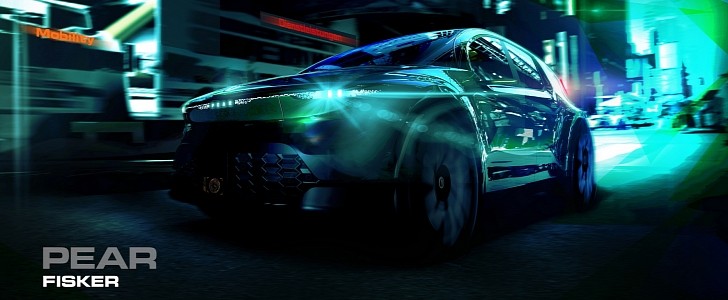Fisker showed great timing in presenting the newest teaser of the PEAR (Personal Electric Automotive Revolution). Lordstown Motors disclosed today that it sold its factory to Foxconn, and Fisker immediately reinforced it wants to produce 250,000 units of its entry-level EV there. Production should start by 2024. Curiously, the rendering has little to do with previous ones, especially those most recent.
We can now clearly see a crossover, which could also be a hatchback with a lot of plastic cladding: it looks much lower than an SUV would be. To be fair, the very first teasers also showed an SUV/crossover shape, but they did not seem to present a design set in stone. Above all, it does not show a sedan, which was our bet for the vehicle after Fisker mentioned a trunk mechanism never seen before – a crossover would have a hatch. Although SUVs and crossovers are very popular, that will make Fisker have two of them with a relatively low price difference.
Fisker wants the PEAR to cost $29,900 before incentives. The cheapest Fisker Ocean is supposed to cost $37,999. However, the Ocean is 4.64 meters (182.7 inches) long, which already places it as a compact SUV by American standards. The PEAR would have to be a subcompact vehicle – the size of a Honda HR-V or a Hyundai Kona – not to cannibalize sales of its bigger brother. The price will be very competitive in this market segment.
The A-pillar seems to have an unusual round shape. If confirmed, that will make the windshield an even more complex component. As renderings allow, it has massive wheels, which may be a problem for its range. The PEAR should use LFP batteries to achieve its price goals.
Another interesting point about Fisker’s tweet is how many EVs it intends to produce at the new Foxconn factory after ramp-up. Although that is not precisely new – Fisker has been talking about 250,000 units at least since February – it’s a lot of EVs.
Tesla took two years to get there after introducing the Model 3 in July 2017. At its peak, the entry-level Tesla reached 80,000 units per quarter in Fremont. Nowadays, Tesla only discloses the production of the Model 3 and the Model Y and also counts what Giga Shanghai delivers, which makes it very hard to determine how many Model 3 units it produces in each factory.
Foxconn will have to hire a lot of people to make that happen. By buying Lordstown Motors, it got 400 employees. They will help it develop the FP28 architecture that will underpin the PEAR. Based on the MIH Open Platform, it should be one of the secrets for this EV to meet its target price.
Fisker wants the PEAR to cost $29,900 before incentives. The cheapest Fisker Ocean is supposed to cost $37,999. However, the Ocean is 4.64 meters (182.7 inches) long, which already places it as a compact SUV by American standards. The PEAR would have to be a subcompact vehicle – the size of a Honda HR-V or a Hyundai Kona – not to cannibalize sales of its bigger brother. The price will be very competitive in this market segment.
The A-pillar seems to have an unusual round shape. If confirmed, that will make the windshield an even more complex component. As renderings allow, it has massive wheels, which may be a problem for its range. The PEAR should use LFP batteries to achieve its price goals.
Another interesting point about Fisker’s tweet is how many EVs it intends to produce at the new Foxconn factory after ramp-up. Although that is not precisely new – Fisker has been talking about 250,000 units at least since February – it’s a lot of EVs.
Tesla took two years to get there after introducing the Model 3 in July 2017. At its peak, the entry-level Tesla reached 80,000 units per quarter in Fremont. Nowadays, Tesla only discloses the production of the Model 3 and the Model Y and also counts what Giga Shanghai delivers, which makes it very hard to determine how many Model 3 units it produces in each factory.
Foxconn will have to hire a lot of people to make that happen. By buying Lordstown Motors, it got 400 employees. They will help it develop the FP28 architecture that will underpin the PEAR. Based on the MIH Open Platform, it should be one of the secrets for this EV to meet its target price.
#BusinessUpdate: We are excited to confirm the production location of our 2nd vehicle – #FiskerPEAR will be based on Fisker’s proprietary platform & assembled at Foxconn's manufacturing facility in Ohio, starting 2024. We expect to build approx 250,000 units a year post ramp up! pic.twitter.com/EWXyQtiorS
— Fisker Inc. (@FiskerInc) May 12, 2022








